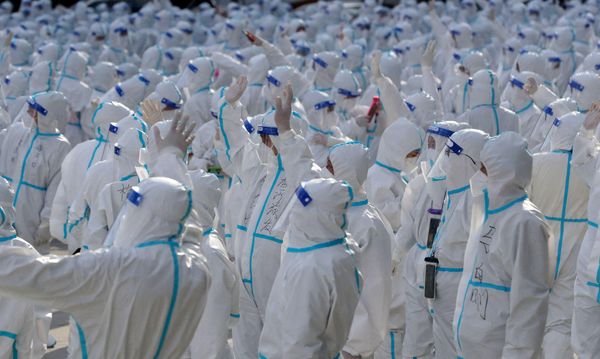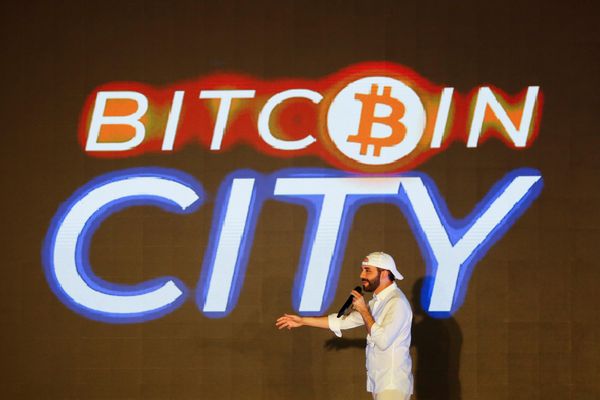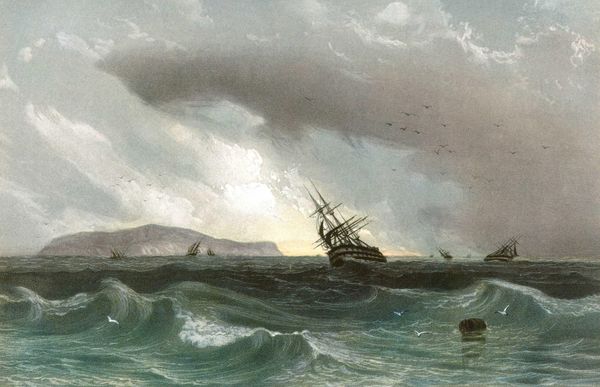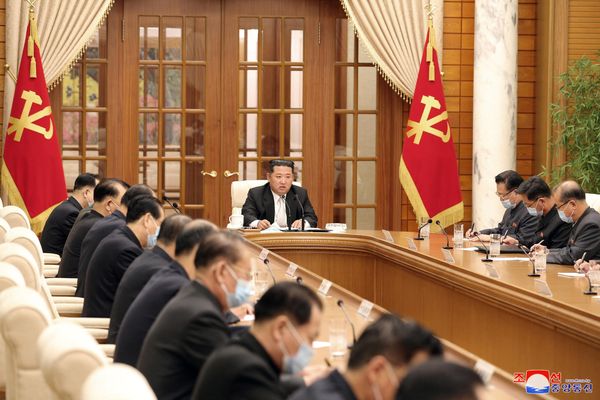Today, we’ll up the ante on China’s COVID conundrum, dodge El Salvador’s crypto bomb, drop by Snake Island, and cast a ballot in Mogadishu. We’ve also got your quiz! Thank you very much for reading Signal. -Willis Sparks
|
|
|
Today, we’ll up the ante on China’s COVID conundrum, dodge El Salvador’s crypto bomb, drop by Snake Island, and cast a ballot in Mogadishu. We’ve also got your quiz! Thank you very much for reading Signal. -Willis Sparks

This week, the head of the World Health Organization warned that China’s “zero-COVID” policy, which has left tens of millions of people locked inside their homes, is not “sustainable.” The omicron variant is too transmissible to effectively isolate, and the cost of China’s lockdown strategy, for the country’s economy and the mental health of its people, is too high, warns the WHO. But … also this week, a report from the peer-reviewed international scientific journal Nature Medicine warned that lifting the zero-COVID policy without taking a series of specific steps to mitigate the damage could create a COVID emergency on a scale the world hasn’t yet seen. More than 1.5 million would die within six months, according to the study, and demand for intensive care would be nearly 16 times greater than China’s hospitals can handle.
Limiting damage from a lifting of restrictions, according to the report, would demand the widespread availability of recently approved antivirals, more accurate testing, a lot more booster doses, and the vaccination of many more elderly people. According to Michael Hirson, a China expert at Eurasia Group, China isn’t likely to take any major step away from a “dynamic zero-COVID” strategy of mass testing and strict quarantines to contain any outbreak of the virus. “For now, they’re more likely to tighten than to loosen,” says Hirson. The stakes are growing, and not just for China. The uncertainty weighing on the entire global economy has many sources. Post-COVID damage to global supply chains and the impact of Russia’s war on Ukraine on food and fuel prices are major contributors. But the effect of COVID lockdowns on the world’s second-largest economy, including on the more than 26 million people who live in Shanghai, the world’s busiest port, is also depressing growth expectations and stoking global inflation. By one estimate, dozens of cities responsible for about 30% of China’s economic output and a combined 290 million people (88% of the total US population) are currently under full or partial lockdown. When measured strictly by the number of COVID deaths, China’s policy has been a big success. It has reported fewer than 14,000 COVID-related deaths. Even if the true number is significantly higher, that compares very well with the one million deaths that have now been reported in the US, a country with less than a quarter of China’s population. But the speed with which omicron can move through a society that has no access to the world’s most effective vaccines and boosters – and little of the immunity that comes with much greater exposure to the virus – could generate an unprecedented emergency inside China over the next few months. The economic, mental health, and potential political downside to sticking with an uncompromising lockdown strategy, however, comes at a cost. China’s government is encouraging already deeply indebted companies to continue borrowing to boost sagging economic growth, compounding a problem that can inflict long-lasting damage to China’s economy. The stresses of isolation are flooding mental health hotlines with calls. Angry messages are lighting up Chinese social media. It’s all happening at a moment of historic political sensitivity in China. This fall, President Xi Jinping hopes to choreograph a Communist Party Congress that will set aside practices of the past to grant him an unprecedented third term as China’s leader. This week’s warnings make clear that Xi faces tough choices: stick with a policy that imposes pain on tens of millions of people and takes a large bite out of China’s economy or publicly shift course and adopt an uncertain new strategy. China’s president is well aware that neither choice can guarantee that China avoids a health and economic crisis at the worst possible political moment.
India's PM is trying to avoid siding too closely with anyone these days, but Vladimir Putin, Joe Biden, and Boris Johnson won't leave him alone. Even his summer vacation is a matter of high geopolitics. See the latest Puppet Regime here.

Has El Salavdor’s crypto experiment bombed?
Mass protests erupted last fall after Nayib Bukele, El Salvador’s youthful, tech-savvy president with an authoritarian streak, announced that the country would begin accepting Bitcoin as legal tender. Many Salvadorans said Bukele’s embrace of the volatile currency would spur inflation and financial instability. Those warnings have proven prescient. In recent days, the crypto world has been caught in a tailspin, in part because global inflation has lowered investors’ tolerance for risk. Bitcoin and Etherium, the biggest cryptocurrencies, have both declined in value by 20-25% this week alone – and El Salvador is recording losses of about 37% based on what it forked out for crypto in a series of purchases. This has proven to be a disaster for Bukele: two major credit rating agencies predict El Salvador will default on its loans. Meanwhile, two major credit rating agencies predict El Salvador will default on its loans, and it has an IMF repayment due in January worth a whopping $800 million, in addition to other debt. Amid negotiations earlier this year, the international lender warned that “Bitcoin should not be used as an official currency with legal tender status.” Still, the enigmatic Bukele continues to double down: this week, he released plans for the Bitcoin city he touted last fall – a smart city based on the use of the flailing currency.
Somalia's long-overdue presidential electionFifteen months behind schedule and facing a May 17 deadline to avoid getting cut off from foreign aid, Somalia will finally hold its presidential election on Sunday. There are lots of familiar faces among the 39 candidates, including two former presidents, a former prime minister, and current President Mohamed Abdullahi Mohamed, aka Farmaajo, a former US civil servant. When his term expired in February 2021, Farmaajo convinced the lower house of parliament to unilaterally extend it by two years, and then later backtracked following an outcry from the upper house and donors. He faces a tough challenge, especially from supporters of PM Mohamed Hussein Roble, who for months has been locked in a power struggle with Farmaajo over control of the government. (Roble is not running, but his supporters will follow his lead in parliamentary voting.) Further complicating matters, the vote is a quasi-democratic "indirect" election by all 329 members of parliament in which a candidate needs a two-thirds majority to avoid a runoff. The winner, if we ever get one, will face myriad problems, with security issues topping the list. Just this week, the militant group al-Shabab attacked a site near Mogadishu’s airport, where lawmakers will cast their ballots in a hangar surrounded by armed troops.

One of the most important battles raging in the Russia-Ukraine war is over Snake Island, a tiny, craggy, largely uninhabitable speck of land in the Black Sea off the southwestern coast of Ukraine.
If Snake Island sounds familiar, that’s because you are either part of an Achilles cult (more about that below) or because it’s where, in the first days of the war, Ukrainian troops famously responded to a Russian demand to surrender with the radio message: “Russian Warship, Go F**k yourself.” Although those words became one of the early battle cries of social media support for Ukraine, the Russians still managed to take tenuous control over the island and have been there ever since. In recent days, however, Ukrainian forces have launched a furious assault, reportedly using drones and bombers to try to dislodge Russian troops, so far without success. Snake Island is a small rock with big significance. If Putin’s army is able to set up long-range air defenses and other military supplies there, that could cripple Kyiv’s ability to defend the entire southwestern coast, including Odesa, Ukraine’s largest port. But Russian control over Snake Island is also a problem for the rest of us. Moscow is using it to help support a naval blockade against Ukraine that keeps vital exports of grain and cooking oils from reaching the rest of the world. With global food prices rising, the UN has already warned that war-related disruptions of Ukrainian food exports could help push nearly to 2 billion people closer to starvation. Now, about Achilles — Snake Island was known to the ancient world as the mythical site of a temple to the Trojan War hero. Some writers claim he was buried there. As we all know, Achilles had a legendary weak heel. Some 2,000 years later, will Snake Island be the small vulnerability that has a big impact on one side or the other in today’s war?
Staying up to date on international news and politics? Prove it by taking our quiz here.

1: North Korean authorities have acknowledged a COVID outbreak for the first time since the pandemic began, a claim no one believes. This is a scary reality in a country with a weak healthcare system and no vaccines.
1 million: The United States reached a grim milestone Thursday, surpassing more than 1 million deaths from COVID-19 since the first case was detected in the US in January 2020. The daily national death rate has fluctuated, peaking in early 2021.
411: British oil giant Shell has agreed to sell 411 gas stations, along with other assets in Russia, to a state-backed Russian oil producer. When Vladimir Putin invaded Ukraine in February, Shell was one of several energy companies that vowed to cut ties with the Kremlin. 6: Days after his older brother resigned as PM amid violent protests, Sri Lanka’s President Gotabya Rajapaksa has tapped longtime MP and ally Ranil Wickremesinghe for the post, marking his sixth stint as the Sri Lankan PM. Wickremesinghe has scarce popular support, and the move is unlikely to quell the spiraling situation in Colombo, where the economy has imploded and demands for the president’s resignation persist.
Words of wisdom “You caused this. Look at the mirror.” – Finland’s President Sauli Niinistö, asked what he would say to Russia about his country’s bid to join NATO. This edition of Signal was written by Gabrielle Debinski, Alex Kliment, Carlos Santamaria, and Willis Sparks. Edited by Tracy Moran. Spiritual Counsel from Sagittarius A*.
|
|
|
|